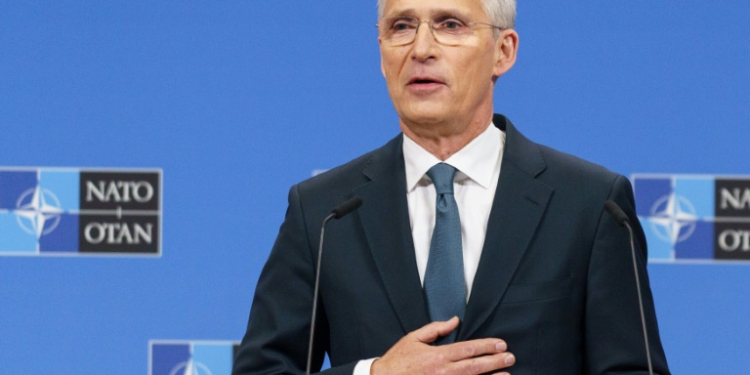Washington (AFP) – NATO’s chief called Monday for China to face consequences if it keeps up support to Russia as he trumpeted a sharp increase in allies’ defense spending since the invasion of Ukraine.
Secretary-General Jens Stoltenberg said that Kyiv needed predictable and steady military funding as he hailed the uptick in NATO member defense budgets — addressing a key factor behind Donald Trump’s skepticism about helping Ukraine.
NATO next month celebrates its 75th anniversary with a summit in Washington that aims to send a decisive long-term message of support for Ukraine ahead of President Joe Biden’s reelection fight against Republican candidate Trump in November.
“The more credible our long-term support, the quicker Moscow will realize it cannot wait us out,” Stoltenberg said on a visit to the US capital to lay the groundwork.
“It may seem like a paradox, but the path to peace is more weapons for Ukraine,” he said.
Stoltenberg accused China of worsening the conflict through what US officials say is a major export push to rebuild Russia’s defense industry.
President Xi Jinping “has tried to create the impression that he is taking a back seat in this conflict, to avoid sanctions and keep trade flowing,” Stoltenberg said.
“But the reality is that China is fueling the largest armed conflict in Europe since World War II, and at the same time, it wants to maintain good relations with the West,” he said.
“Beijing cannot have it both ways. At some point — and unless China changes course — allies need to impose a cost. There should be consequences,” Stoltenberg added.
In addition to the 32 members of the NATO alliance, the summit will also bring in four key partners from the Asia-Pacific: Australia, Japan, New Zealand and South Korea.
China argues that it is not sending lethal assistance to either side — unlike the United States and other Western nations.
Beijing steered clear of a weekend summit in Switzerland promoted by Ukrainian President Volodymyr Zelensky that reaffirmed Kyiv’s demands for Russia to leave Ukrainian territory for any peace.
– Rising NATO spending –
Stoltenberg said that Russian President Vladimir Putin’s visit this week to North Korea, which has supplied shells to Moscow despite being under UN sanctions, further showed how Moscow was “dependent” on authoritarian leaders.
Trump — who in the past has voiced admiration for Putin — has boasted that he can quickly end the war, likely by pressing Ukraine to accept demands.
Trump has long raged over what he sees as unfairness in NATO, founded to counter the Soviet Union.
On the campaign trail, he has suggested he would encourage Russia to “do whatever the hell they want” if NATO members do not “pay your bills.”
In the Oval Office, Stoltenberg told Biden that 23 of the 32 allies now met a pledge to spend at least two percent of GDP on defense, as the Ukraine invasion brings new security fears to Europe.
A 2014 NATO summit set the funding goal that was then met by only three countries — the United States, Britain and Greece.
Stoltenberg last reported that 20 countries were achieving the target.
“NATO allies are this year increasing defense spending by 18 percent. That’s the biggest increase in decades,” Stoltenberg said.
In a sharply different message than Trump, Biden hailed NATO, saying that since it has successfully “deterred further Russian aggression in Europe” through its promise to “defend every inch of NATO territory.”
– Bracing for Trump –
In an unstated bid to “Trump-proof” future efforts, Stoltenberg wants the Washington summit to commit the alliance to provide at least 40 billion euros ($43 billion) a year in military aid to Ukraine and to put NATO in charge of coordination.
Speaking to reporters after his Wilson Center speech, Stoltenberg did not criticize Trump but pointed to the damage done on the battlefront by the delay in Congress approving a $60 billion package for Ukraine.
“Regardless of who’s going to be the next president of the United States,” Stoltenberg said, “I believe that we should minimize the risk.”
Stoltenberg, who led NATO throughout Trump’s 2017-2021 presidency, said that successive US administrations had “an absolutely valid point to say that European allies are spending too little.”
“The good news is that’s changing,” Stoltenberg said. “We’re not saying that we are satisfied, but we are in a totally different place now than we were back in 2014,” he said.
© 2024 AFP











